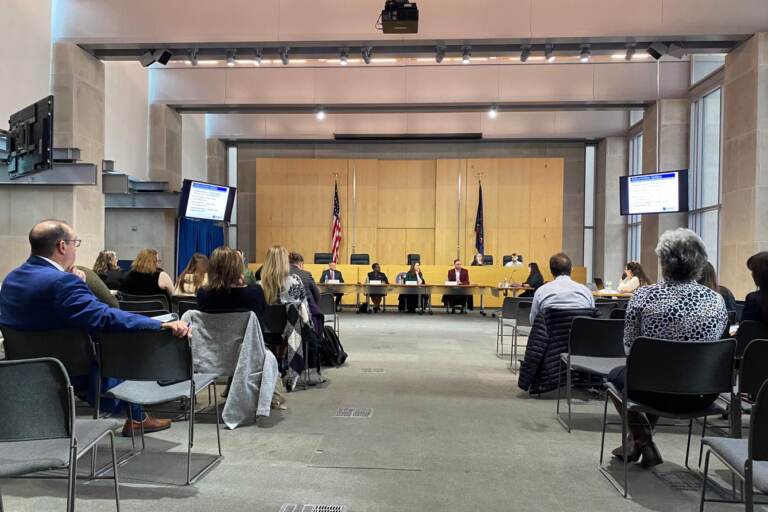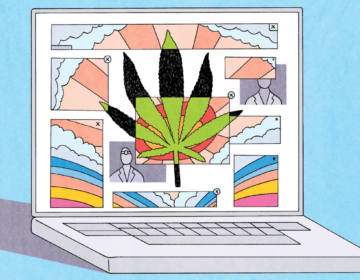Health officials in Pa. face scrutiny over weak oversight of medical marijuana doctors
Members of Pennsylvania’s Medical Marijuana Advisory Board are publicly questioning the Wolf administration’s oversight of doctors and third-party certification companies.

Members of Pennsylvania’s Medical Marijuana Advisory Board meet in Harrisburg on Nov. 22, 2022. (Ed Mahon/Spotlight PA)
This originally appeared on Spotlight PA.
Members of Pennsylvania’s Medical Marijuana Advisory Board are publicly questioning the Wolf administration’s oversight of doctors and third-party certification companies, concerns that echo a yearlong Spotlight PA investigation into the state’s program.
During the most recent advisory board meeting in November, health department officials faced scrutiny over the rigor of telemedicine appointments for medical marijuana card approvals and advertising by medical marijuana businesses.
Daniel Kambic, a physician and board member, referred to the current situation as “a little sloppy,” although it wasn’t clear whether he was specifically referring to certifications themselves, the department’s oversight, or both. “I think we need to tighten it up a little bit,” Kambic said.
Each year, hundreds of thousands of patients must receive approval from a physician if they want to legally use cannabis in the state. Some patients connect to these physicians through largely unregulated third-party companies. Spotlight PA’s reporting revealed that some of these businesses make misleading or incorrect medical claims, benefit from unequal advertising rules, and allegedly tie a doctor’s payment to patient approvals.
Department of Health officials have repeatedly insisted the agency doesn’t have oversight of third-party companies that help patients schedule appointments with doctors. But they’ve also provided few details about how the department ensures that the state’s more than 1,800 approved physicians review a patient’s available medical records and provide appropriate consultations.
Denise Johnson, the state’s physician general and acting health secretary, told board members the department would provide more details before the next meeting. But she emphasized the importance of patient complaints.
“We’re not able to oversee every situation, and so we do need to get those specific reports,” she said.
It’s rare for the department to formally discipline a doctor over potential violations of the state’s medical marijuana rules. The health department recently accepted a recommendation to briefly suspend a practitioner’s ability to issue certifications after a patient complained that the doctor did not review her medical records during a telehealth appointment.
When Democratic Gov. Tom Wolf and the Republican-controlled legislature first legalized medical marijuana in 2016, they specifically required doctors to meet with patients in person to approve them for medical marijuana. But the Department of Health waived the in-person requirements at the start of the coronavirus pandemic, and Wolf and the legislature changed state law in 2021 to permanently allow for telehealth appointments.
At one point during the advisory board meeting, member Diana Briggs noted that she and her son recently received certifications through telemedicine appointments and needed to provide records of their diagnoses for qualifying conditions.
But another board member, I. William Goldfarb, suggested that Briggs’ experience might be unusual.
“That’s excellent,” Goldfarb, a doctor, replied. “I certainly applaud that. But … I’m not confident that the vast majority of individuals who are willing to provide certification by telemedicine are that thorough.”
Laura Mentch, director of the state’s Office of Medical Marijuana, acknowledged there was “controversy” over the quality of those consultations.
Col. Robert Evanchick, an advisory board member and commissioner for the Pennsylvania State Police, told Spotlight PA he would like to explore the department’s oversight powers for third-party companies. In Pennsylvania, physicians are banned from advertising their ability to provide a certification, a rule that does not apply to medical marijuana card companies.
“I know we have oversight over the physicians as far as advertising,” Evanchick said after the meeting. “But we have these companies now who are kind of going out, and I don’t want to say advertising for the physicians — but, in reality, that’s kind of what they’re doing.”

Saturdays just got more interesting.
WHYY is your source for fact-based, in-depth journalism and information. As a nonprofit organization, we rely on financial support from readers like you. Please give today.




